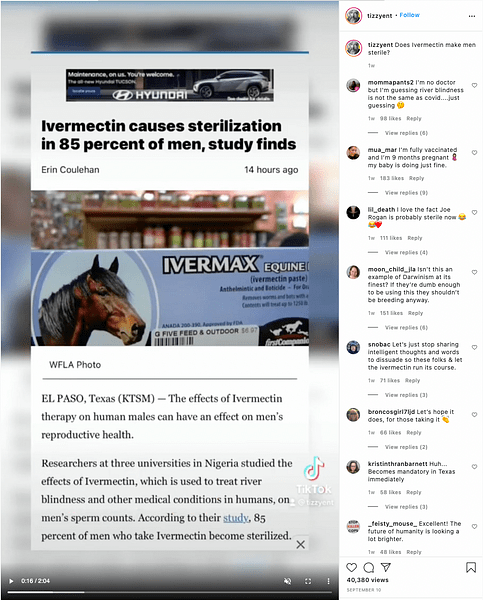Widely shared social media posts claim that ivermectin, an anti-parasitic medication that some are using to treat COVID-19 despite little evidence of efficacy, sterilizes 85 percent of men who use the drug.

For context, the FDA has warned against using ivermectin to treat COVID-19, saying that “the FDA has not authorized or approved ivermectin for use in preventing or treating COVID-19 in humans or animals. Ivermectin is approved for human use to treat infections caused by some parasitic worms and head lice and skin conditions like rosacea.”
However, the claim that it causes male infertility is unproven.
The claim stems from a 2011 study from Nigeria that screened 385 patients diagnosed with onchocerciasis, a parasitic disease caused by the worm Onchocerca volvulus and published in the Archives of Applied Science Research, a self-described “peer-reviewed, open-access journal.”
The journal’s publisher, Scholars Research Library, is included on Beall’s list, a list of predatory journals and publishers, which as we noted in an earlier fact check, means that authors can publish studies without review as long as they pay a publication fee.
At the outset of the study, only 37 of the 385 participants had a normal sperm count, which means they were the only ones who could be followed for the 11-month duration of the study. Gideon Meyerowitz-Katz, an epidemiologist at the University of Wollongong in Australia noted on Twitter that “it’s impossible to draw any firm conclusions.”
Meyerowitz-Katz also pointed out that the study in question has no control group which, as explained in the SAGE Encyclopedia of Communication Research Methods, is “an important aspect of true experimental designs,” and “the presence of control groups allows researchers to confirm that study results are due to the manipulation of independent variables (IVs) rather than extraneous variables.”
Because there was no control group, Meyerowitz-Katz said that it’s “hard to tell if the medication [ivermectin] contributed” to the participant’s low sperm count and that perhaps “the authors were surveilling a very unwell population who happened to be taking ivermectin.”
Furthermore, the FDA does not list male sterilization as a side effect of ivermectin, but instead includes the following side effects of overdosing on the drug: “nausea, vomiting, diarrhea, hypotension (low blood pressure), allergic reactions (itching and hives), dizziness, ataxia (problems with balance), seizures, coma and even death.”
A spokesperson from the FDA told The Dispatch Fact Check via email that “The labeling for ivermectin and its bioequivalents states that ivermectin had no adverse effects on the fertility in rats in studies at repeated doses of up to 3 times the maximum recommended human dose of 200 mcg/kg (on a mg/m2/day basis).”
If you have a claim you would like to see us fact check, please send us an email at factcheck@thedispatch.com. If you would like to suggest a correction to this piece or any other Dispatch article, please email corrections@thedispatch.com.







Please note that we at The Dispatch hold ourselves, our work, and our commenters to a higher standard than other places on the internet. We welcome comments that foster genuine debate or discussion—including comments critical of us or our work—but responses that include ad hominem attacks on fellow Dispatch members or are intended to stoke fear and anger may be moderated.
With your membership, you only have the ability to comment on The Morning Dispatch articles. Consider upgrading to join the conversation everywhere.